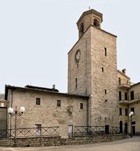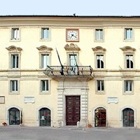

Torre Civica (12th century)

Palazzo del Podestà (18th century)
This palace (to the left in the photograph above), which was built after the earthquake of 1751, now houses the Museo Regionale dell’Emigrazione Pietro Conti.
Palazzo Comunale (1768-9)

Panels (17th century)
These panels in the Pinacoteca Comunale, which are attributed to Francesco Allegrini, probably came from Palazzo Comunale. They depict:
-
✴the Judgement of Solomon; and
-
✴Lot and his Daughters.

